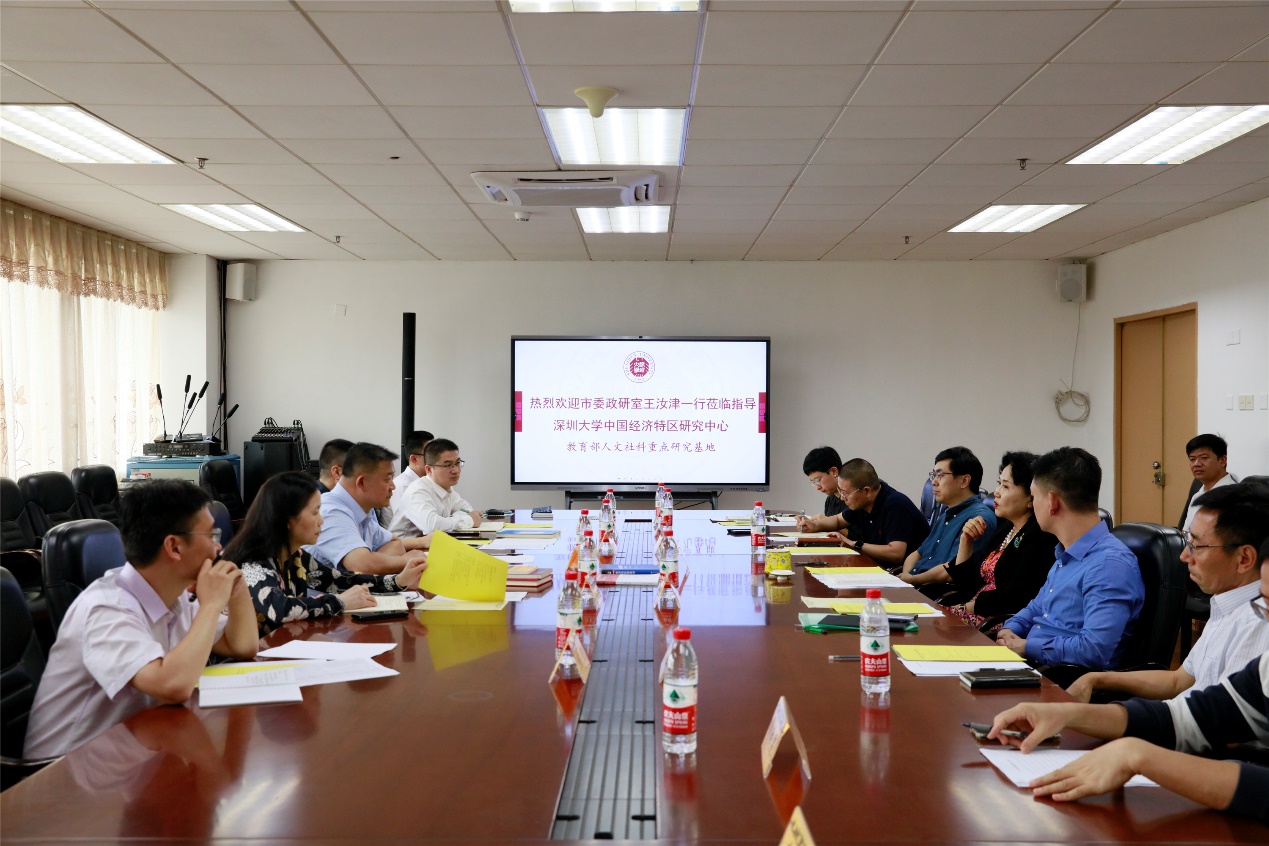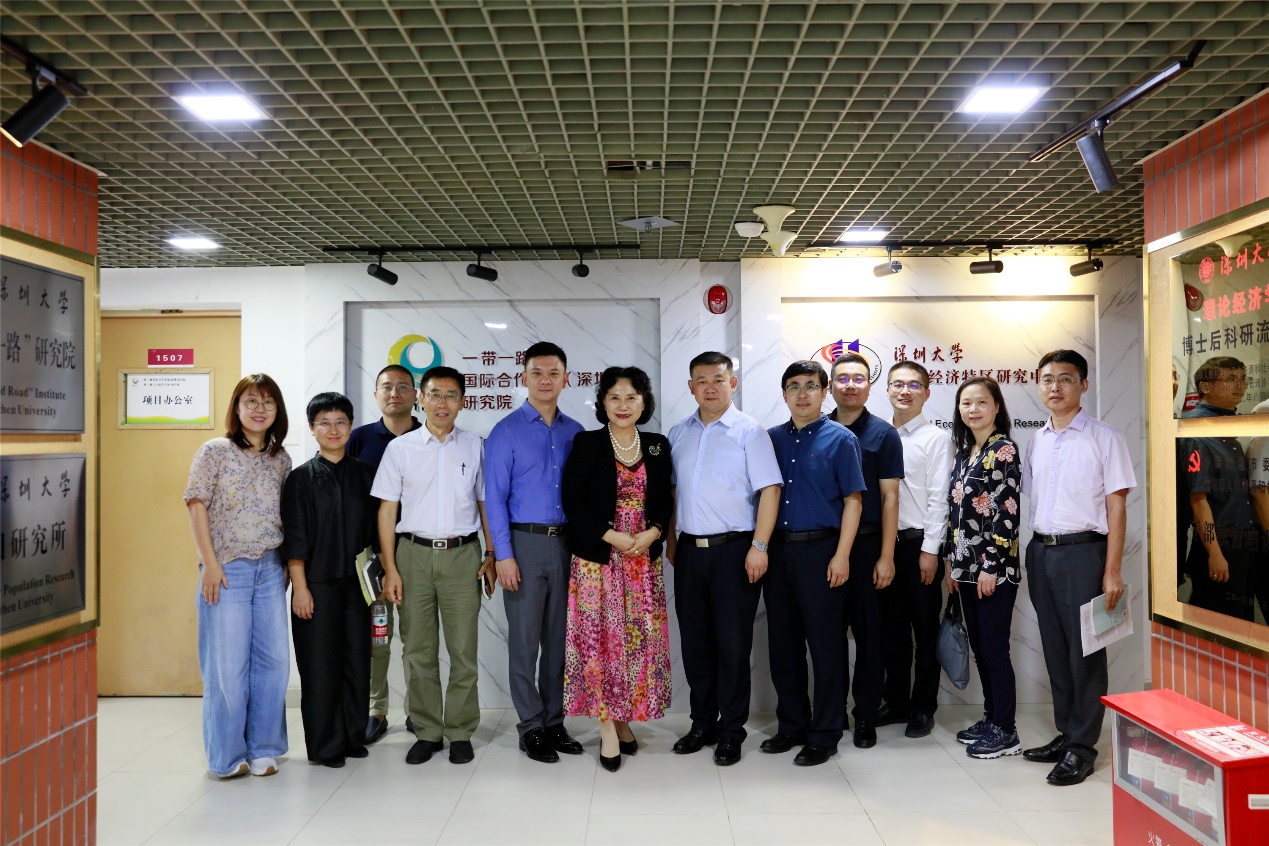On the afternoon of October 13, a delegation led by Wang Rujin, Deputy Director of the Policy Research Office of Shenzhen Municipal People’s Government, visited China Center for Special Economic Zone Research (CCSEZR), Shenzhen University (SZU), and discussed the development of theoretical research in social sciences and the construction of periodicals and the achievements of SZU, especially CCSEZR. Wu Baoshui, Deputy Secretary of the Party Committee of SZU, received the delegation.

Attending the meeting were Prof. Tao Yitao, Director of CCSEZR, Chao Naipeng, Dean of School of Media and Communication, SZU, Zhan Di, Deputy Director of the Social Science Department, SZU, Yuan Yiming, Professor of CCSEZR, Zhang Ping, Associate Professor of CCSEZR, Zhou Yikun, Associate Editor of “The Studies on China’s Special Economic Zones”, Yong Wei, Associate Editor of “Loose-leaf Collection of Suggestions”, Zhu Xuan, Director Assistant of the Centre for Indian Studies of Shenzhen University, and other teacher representatives.
Director Zhan Di presided over the meeting. Director Wang Rujin first introduced the organizational structure and key research fields of the Policy Research Office and expressed the willingness to establish a closer relationship with SZU in the fields of humanities and social sciences and implement the instructions given by the leaders of Shenzhen Municipal People’s Government during their visit to SZU and CCSEZR on the 40th anniversary of SZU. During the speech, Director Tao Yitao introduced the main work of the CCSEZR (the key research base for humanities and social sciences under the Ministry of Education of China), and especially emphasized the notable achievements of the CCSEZR in the history of economic thought of special economic zones in China, in the history of economy in China’s reform and opening-up and other characteristic research fields. She pointed out that the overseas publication of the “Report on the Development of China’s Special Economic Zones” (Bluebook) and “The Studies on China’s Special Economic Zones” (Journal) for consecutive years have greatly enhanced the international influence of the study of China’s special economic zones. However, the overseas publication has been suspended due to various restrictions. She hoped that the cooperation in related fields could be strengthened through close cooperation with the Policy Research Office.
Director Zhan Di introduced the scientific and research achievements of SZU in the field of social sciences in recent years. At present, SZU has 14 liberal arts colleges and 6 relatively independent research institutes constituting a full range of academic disciplines of SZU. They aim to make significant contributions in the fields of humanities and social sciences for the construction of high-level universities of SZU concerning approval of high-level projects, output of high-level achievements, construction of high-quality platforms, and development of high-caliber talents based on the principle of “big projects - big achievements - big platforms - big teams”. Prof. Chao Naipeng and Teacher Zhu Xuan introduced the development of their institutions, respectively.
Prof. Zhang Ping introduced the development history and research characteristics of the CCSEZR. He pointed out that the history of the CCSEZR can be dated back to 1984 when its predecessor Economic Studies Institute was established. In 2001, the key research base for humanities and social sciences under the Ministry of Education of China was established, marking the gradual establishment of a complete system of discipline construction and talent development for undergraduate, postgraduate, doctoral and postdoctoral programs. The delegation and the CCSEZR exchanged views on the author groups, sources of manuscripts and funding for the Blue Book, the Academic Journal and the Loose-leaf Collection of Suggestions. They stated that the two sides can strengthen academic exchanges and cooperation in postdoctoral talent training relying on the Postdoctoral Program of Theoretical Economics of Shenzhen University.


